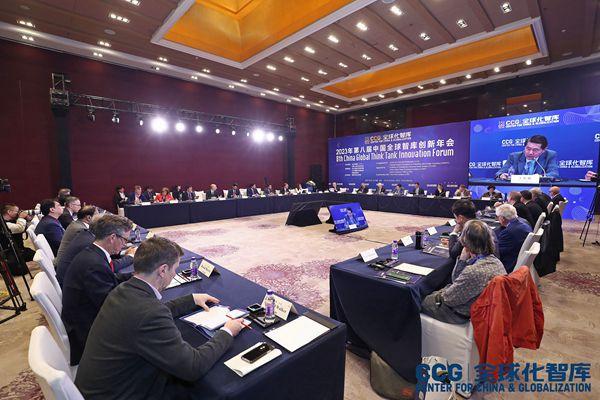Think tanks discuss global order at roundtable in Beijing
- By Xu Xiaoxuan
 0 Comment(s)
0 Comment(s) Print
Print E-mail China.org.cn, October 25, 2023
E-mail China.org.cn, October 25, 2023

Think tank experts and scholars at a roundtable discussion during the eighth China Global Think Tank Innovation Forum in Beijing, Oct. 23, 2023. [Photo courtesy of Center for China and Globalization]
In the post-pandemic era, how will the global order, which is currently at a crossroads, move forward? In response to this question, think tank experts and scholars from around the world gathered in Beijing on Monday at a roundtable discussion during the eighth China Global Think Tank Innovation Forum to discuss potential insightful answers.
Erik Solheim, vice-chair of the board of the Europe-Asia Center and former under-secretary-general of the United Nations, underscored that the 21st century is underpinned by two pillars, namely mutual respect for different civilizations and dialogue for the settlement of issues.
Joseph Nye, dean emeritus of Harvard University's John F. Kennedy School of Government and a renowned U.S. political scientist, spotlighted China-U.S. relations and dismissed the view that a new Cold War currently exists between China and the U.S., as cooperation and interdependence in such fields as trade, education and ecological conservation still mark bilateral relations. Therefore, he called for competitive collaboration and coexistence for the two countries.
Rong Ying, vice president of the China Institute of International Studies (CIIS), proposed a "1+2+3" scheme to materialize globalized win-win cooperation for peaceful development. Specifically, "1" indicates the vision of a single global community of shared future, "2" signifies the two platforms of a Chinese path to modernization and the Belt and Road Initiative, and "3" points to the China-proposed Global Development Initiative, Global Security Initiative and Global Civilization Initiative.
Sun Jisheng, vice president of China Foreign Affairs University, pointed out that the current digital age has such a strong spillover effect that any regional problem that is not properly addressed will drag down the whole world. She added that under such circumstances, think tanks are expected to build mutual trust and consensus to seek solutions and positively influence the policy and decision-making process.
The annual China Global Think Tank Innovation Forum was jointly initiated by the Center for China and Globalization (CCG) and the University of Pennsylvania's Think Tanks and Civil Societies Program (TTCSP) in 2016, with the aims of exploring the challenges and responses of global think tanks amid new changes and offering innovative and forward-thinking solutions to global issues.






Go to Forum >>0 Comment(s)